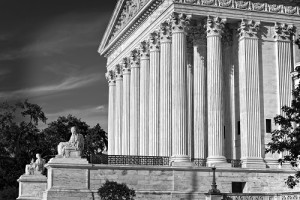Week in Review: Court Considers Potential Landmark Cases

The U.S. Supreme Court heard oral arguments in five cases last week. Several of the decisions have the potential to be blockbusters, with high-profile Constitutional issues at stake. Below is a brief summary of these potential landmark cases:
Dollar General Corporation v. Mississippi Band of Choctaw Indians:
The justices are poised to determine the fate of tribunal courts administered by Native Americans. The specific issue before the Court is “whether Indian tribal courts have jurisdiction to adjudicate civil tort claims against nonmembers, including as a means of regulating the conduct of nonmembers who enter into consensual relationships with a tribe or its members.”
Franchise Tax Board of California v. Hyatt:
The case addresses sovereignty of one state in another’s court, a question that dates back to the founding of our country. In oral arguments, the Court considered the following questions: (1) Whether Nevada may refuse to extend to sister States haled into Nevada courts the same immunities Nevada enjoys in those courts; and (2) whether Nevada v. Hall, 440 U.S. 410 (1979), which permits a sovereign State to be haled into the courts of another State without its consent, should be overruled.
Harris v. Arizona Independent Redistricting Commission:
In a case that could impact redistricting maps all over the country, the justices will determine the acceptable level of partisanship in the redistricting process. The specific issues the Court include 1. Does the desire to gain partisan advantage for one political party justify intentionally creating over-populated legislative districts that result in tens of thousands of individual voters being denied Equal Protection because their individual votes are devalued, violating the one- person, one-vote principle? 2. Does the desire to obtain favorable preclearance review by the Justice Department permit the creation of legislative districts that deviate from the one-person, one-vote principle? And, even if creating unequal districts to obtain preclearance approval was once justified, is this still a legitimate justification after Shelby County v. Holder, 133 S.Ct. 2612 (2013)?
Evenwel v. Abbott:
The Court’s second redistricting case revolves around the equality of voting power. The specific issue is whether the “one-person, one-vote” principle under the Equal Protection Clause allows States to use total population, and does not require States to use voter population, when apportioning state legislative districts.
Fisher v. University of Texas at Austin:
The affirmative action case will likely determine whether universities can continue to consider race when making admissions decisions. The specific question before the Court is: Whether the Fifth Circuit’s re-endorsement of the University of Texas at Austin’s use of racial preferences in undergraduate admissions decisions can be sustained under this Court’s decisions interpreting the Equal Protection Clause of the Fourteenth Amendment, including the first iteration of the case (Fisher v. University of Texas at Austin).
Please stay tuned to the blog in the coming weeks, as we will provide more in-depth coverage of the issues at stake in the affirmative action and redistricting cases.
Previous Articles
SCOTUS Decision in Bowe v. United States Is First of the 2026 Term
by DONALD SCARINCI on February 5, 2026
In Bowe v. United States, 607 U.S. ___ (2026), the U.S. Supreme Court held that Title 28 U.S.C. § ...
SCOTUS Rules State Can’t Immunize Parties from Federal Civil Liability
by DONALD SCARINCI on January 29, 2026
In John Doe v. Dynamic Physical Therapy, LLC, 607 U.S. ____ (2025) the U.S. Supreme Court held that...
Supreme Court to Address Racial Discrimination in Jury Selection
by DONALD SCARINCI onWhile the U.S. Supreme Court has concluded oral arguments for the year, it continues to add cases t...
The Amendments
-
Amendment1
- Establishment ClauseFree Exercise Clause
- Freedom of Speech
- Freedoms of Press
- Freedom of Assembly, and Petitition
-
Amendment2
- The Right to Bear Arms
-
Amendment4
- Unreasonable Searches and Seizures
-
Amendment5
- Due Process
- Eminent Domain
- Rights of Criminal Defendants
Preamble to the Bill of Rights
Congress of the United States begun and held at the City of New-York, on Wednesday the fourth of March, one thousand seven hundred and eighty nine.
THE Conventions of a number of the States, having at the time of their adopting the Constitution, expressed a desire, in order to prevent misconstruction or abuse of its powers, that further declaratory and restrictive clauses should be added: And as extending the ground of public confidence in the Government, will best ensure the beneficent ends of its institution.





